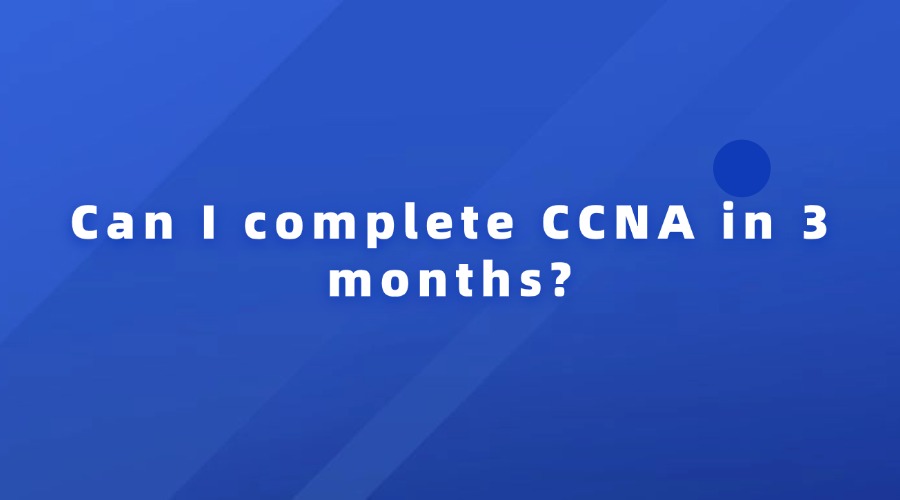How long does it take to self-study for CCNA?
Update time:2024-11-08
Self-studying for the Cisco Certified Network Associate (CCNA) certification is a significant commitment, but one that can be highly rewarding. For individuals who want to pursue a career in networking, earning the CCNA certification demonstrates mastery of foundational networking concepts, making them competitive candidates for entry-level IT positions. One of the common questions prospective CCNA candidates ask is: “How long does it take to self-study for CCNA?”

The answer depends on several factors, including your prior knowledge of networking, the amount of time you can dedicate to studying each day, and the resources you use. In this article, we’ll break down these factors and provide some realistic timelines for self-study, along with tips for preparing effectively.
1. Understanding the Scope of the CCNA Exam
Before diving into a self-study plan, it’s essential to understand the scope of the CCNA exam. The CCNA curriculum covers a wide range of topics, including:
Network fundamentals
IP connectivity
IP services
Security fundamentals
Automation and programmability
The exam tests your ability to configure and troubleshoot routers and switches, understand network security principles, and work with both IPv4 and IPv6 networks. Because of the breadth of knowledge required, the amount of time it takes to prepare varies significantly from person to person.
2. Factors Affecting Your Study Timeline
There’s no one-size-fits-all answer to how long it takes to self-study for CCNA because different people have different backgrounds, commitments, and learning styles. Here are some factors that influence your timeline:
a) Your Prior Knowledge
Beginner: If you have little to no background in networking, expect your preparation to take longer—around 4 to 6 months. You’ll need to familiarize yourself with basic networking concepts, how networks function, and the specific technologies covered in the CCNA curriculum.
Intermediate: If you have some experience, perhaps from working in IT support or a related field, you may be able to prepare within 3 to 4 months. You’ll likely already have some knowledge of routing, switching, and network troubleshooting, which will reduce your study time.
Advanced: If you’ve been working in networking for some time or have completed previous networking certifications, you might be able to pass the CCNA exam with 2 to 3 months of dedicated self-study. Your existing knowledge will make it easier to grasp the more advanced topics covered in the exam.
b) Time Commitment
The amount of time you can dedicate to studying each day or week plays a big role in determining how quickly you can be ready for the exam. Here’s a rough guide based on different study schedules:
Full-time study: If you can dedicate 6 to 8 hours a day, you could be ready to take the CCNA exam within 6 to 8 weeks. However, this level of intensity is typically only possible for people who aren’t working full-time or have a flexible schedule.
Part-time study: If you can commit 2 to 3 hours a day, expect to spend 3 to 4 months preparing. This is a more common schedule for people who are working full-time or have other commitments.
Weekend study: If you only have time to study on weekends, it could take 5 to 6 months to be fully prepared for the exam. This schedule is slower, but consistent progress over time can still get you ready.
Contact me immediately to get the golden key helping you fast express your certificate.
3. Creating an Effective Study Plan
Once you have an idea of how long you can expect to spend studying, creating an organized and effective study plan is essential. Here’s a guide to help you structure your preparation:
a) Set Clear Goals
Start by outlining the key areas covered in the CCNA exam. Break these down into manageable sections and assign specific topics to study each week. For example, you might focus on network fundamentals for the first two weeks, move on to IP connectivity the next week, and then tackle security fundamentals in the following weeks.
b) Choose the Right Study Materials
Using the right resources is crucial to effective self-study. There are several resources you can use, including:
Cisco’s Official Study Guides: Cisco offers official CCNA study materials, including books and practice tests, which provide a structured approach to learning.
Video Courses: Platforms like Udemy, Coursera, and CBT Nuggets offer video tutorials that walk you through each topic step-by-step. These can be especially helpful if you’re a visual learner.
Hands-on Practice: Gaining practical experience is key to passing the CCNA exam. You can use Cisco’s Packet Tracer or GNS3 to simulate network configurations and troubleshoot issues. These tools let you practice real-world scenarios without needing expensive physical hardware.
Practice Tests: Taking regular practice exams will help you gauge your progress and identify areas where you need more study. It also helps you get used to the exam format and timing.
c) Stick to a Schedule
Consistency is key to self-study success. Create a weekly study schedule and stick to it. Aim to cover one topic each week, revisiting difficult concepts as needed. Regularly review what you’ve learned to ensure you retain the information.
4. Balancing Study with Real-World Practice
While reading and watching tutorials is essential, the CCNA exam also emphasizes practical knowledge. You’ll need to know how to configure routers, set up switches, troubleshoot network issues, and apply security measures. Balancing theoretical study with hands-on practice is crucial to passing the exam.
Set up a Lab Environment: If possible, try to set up a home lab with a few physical routers and switches. This is the best way to gain practical experience. If that’s not feasible, use network simulation software like Cisco Packet Tracer, which is widely recommended for CCNA candidates.
Practical Exercises: Incorporate regular labs and exercises into your study schedule. For example, after studying a section on IP connectivity, spend time configuring networks and troubleshooting issues in your simulation environment.
5. Avoid Burnout
Self-studying for the CCNA can be intense, especially if you’re juggling it with a full-time job or other commitments. It’s important to pace yourself and take breaks to avoid burnout. Incorporate downtime into your schedule and take time to absorb what you’ve learned.
Conclusion
The time it takes to self-study for the CCNA exam depends on several factors, including your prior knowledge, the amount of time you can dedicate, and your study resources. On average, most candidates need between 3 to 6 months to prepare. By setting clear goals, using effective study materials, and balancing study with hands-on practice, you can be ready to take the CCNA exam and kick-start your networking career. Remember, consistency is key—study regularly, practice often, and you’ll be well on your way to becoming a CCNA-certified professional.
I'm your man who have the 100% valid dumps , buy it now for 50% off to clear your exam!
Click it ↓↓

The answer depends on several factors, including your prior knowledge of networking, the amount of time you can dedicate to studying each day, and the resources you use. In this article, we’ll break down these factors and provide some realistic timelines for self-study, along with tips for preparing effectively.
1. Understanding the Scope of the CCNA Exam
Before diving into a self-study plan, it’s essential to understand the scope of the CCNA exam. The CCNA curriculum covers a wide range of topics, including:
Network fundamentals
IP connectivity
IP services
Security fundamentals
Automation and programmability
The exam tests your ability to configure and troubleshoot routers and switches, understand network security principles, and work with both IPv4 and IPv6 networks. Because of the breadth of knowledge required, the amount of time it takes to prepare varies significantly from person to person.
2. Factors Affecting Your Study Timeline
There’s no one-size-fits-all answer to how long it takes to self-study for CCNA because different people have different backgrounds, commitments, and learning styles. Here are some factors that influence your timeline:
a) Your Prior Knowledge
Beginner: If you have little to no background in networking, expect your preparation to take longer—around 4 to 6 months. You’ll need to familiarize yourself with basic networking concepts, how networks function, and the specific technologies covered in the CCNA curriculum.
Intermediate: If you have some experience, perhaps from working in IT support or a related field, you may be able to prepare within 3 to 4 months. You’ll likely already have some knowledge of routing, switching, and network troubleshooting, which will reduce your study time.
Advanced: If you’ve been working in networking for some time or have completed previous networking certifications, you might be able to pass the CCNA exam with 2 to 3 months of dedicated self-study. Your existing knowledge will make it easier to grasp the more advanced topics covered in the exam.
b) Time Commitment
The amount of time you can dedicate to studying each day or week plays a big role in determining how quickly you can be ready for the exam. Here’s a rough guide based on different study schedules:
Full-time study: If you can dedicate 6 to 8 hours a day, you could be ready to take the CCNA exam within 6 to 8 weeks. However, this level of intensity is typically only possible for people who aren’t working full-time or have a flexible schedule.
Part-time study: If you can commit 2 to 3 hours a day, expect to spend 3 to 4 months preparing. This is a more common schedule for people who are working full-time or have other commitments.
Weekend study: If you only have time to study on weekends, it could take 5 to 6 months to be fully prepared for the exam. This schedule is slower, but consistent progress over time can still get you ready.
Contact me immediately to get the golden key helping you fast express your certificate.
3. Creating an Effective Study Plan
Once you have an idea of how long you can expect to spend studying, creating an organized and effective study plan is essential. Here’s a guide to help you structure your preparation:
a) Set Clear Goals
Start by outlining the key areas covered in the CCNA exam. Break these down into manageable sections and assign specific topics to study each week. For example, you might focus on network fundamentals for the first two weeks, move on to IP connectivity the next week, and then tackle security fundamentals in the following weeks.
b) Choose the Right Study Materials
Using the right resources is crucial to effective self-study. There are several resources you can use, including:
Cisco’s Official Study Guides: Cisco offers official CCNA study materials, including books and practice tests, which provide a structured approach to learning.
Video Courses: Platforms like Udemy, Coursera, and CBT Nuggets offer video tutorials that walk you through each topic step-by-step. These can be especially helpful if you’re a visual learner.
Hands-on Practice: Gaining practical experience is key to passing the CCNA exam. You can use Cisco’s Packet Tracer or GNS3 to simulate network configurations and troubleshoot issues. These tools let you practice real-world scenarios without needing expensive physical hardware.
Practice Tests: Taking regular practice exams will help you gauge your progress and identify areas where you need more study. It also helps you get used to the exam format and timing.
c) Stick to a Schedule
Consistency is key to self-study success. Create a weekly study schedule and stick to it. Aim to cover one topic each week, revisiting difficult concepts as needed. Regularly review what you’ve learned to ensure you retain the information.
4. Balancing Study with Real-World Practice
While reading and watching tutorials is essential, the CCNA exam also emphasizes practical knowledge. You’ll need to know how to configure routers, set up switches, troubleshoot network issues, and apply security measures. Balancing theoretical study with hands-on practice is crucial to passing the exam.
Set up a Lab Environment: If possible, try to set up a home lab with a few physical routers and switches. This is the best way to gain practical experience. If that’s not feasible, use network simulation software like Cisco Packet Tracer, which is widely recommended for CCNA candidates.
Practical Exercises: Incorporate regular labs and exercises into your study schedule. For example, after studying a section on IP connectivity, spend time configuring networks and troubleshooting issues in your simulation environment.
5. Avoid Burnout
Self-studying for the CCNA can be intense, especially if you’re juggling it with a full-time job or other commitments. It’s important to pace yourself and take breaks to avoid burnout. Incorporate downtime into your schedule and take time to absorb what you’ve learned.
Conclusion
The time it takes to self-study for the CCNA exam depends on several factors, including your prior knowledge, the amount of time you can dedicate, and your study resources. On average, most candidates need between 3 to 6 months to prepare. By setting clear goals, using effective study materials, and balancing study with hands-on practice, you can be ready to take the CCNA exam and kick-start your networking career. Remember, consistency is key—study regularly, practice often, and you’ll be well on your way to becoming a CCNA-certified professional.
I'm your man who have the 100% valid dumps , buy it now for 50% off to clear your exam!
Click it ↓↓














